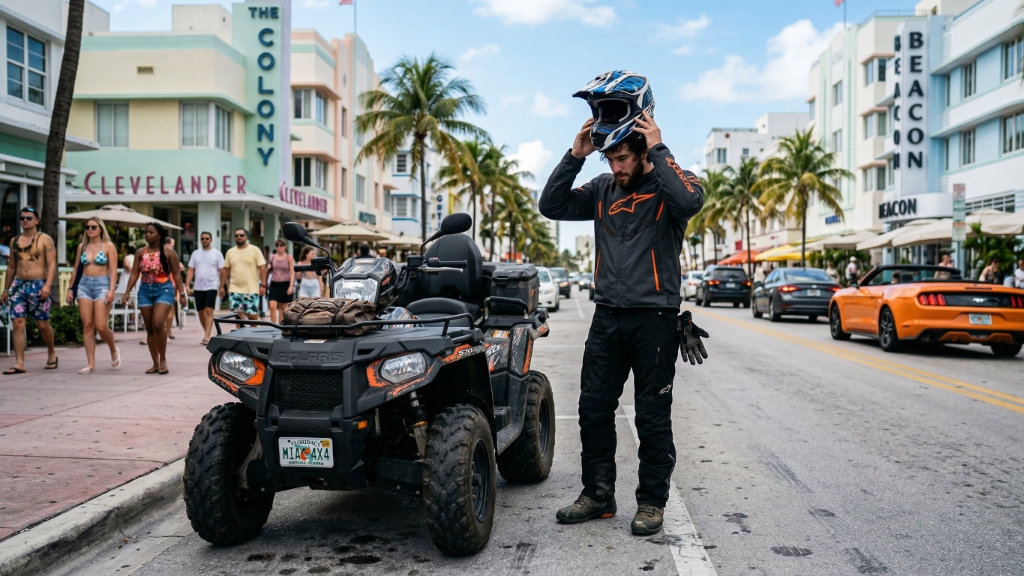Ensuring your Utility Task Vehicle (UTV) is street legal in Oklahoma requires compliance with specific state regulations concerning equipment, registration, and operational guidelines. While Oklahoma does not mandate regular vehicle inspections or emissions testing for UTVs, adherence to safety standards and local ordinances is crucial.
In Oklahoma, the operation of Utility Task Vehicles (UTVs) on public roads is subject to specific regulations that vary based on the type of roadway and local ordinances.
Unpaved Roads:
UTVs may be operated on unpaved roads within the boundaries of properties managed by the U.S. Forest Service.
Operators must yield the right-of-way to oncoming traffic that poses an immediate hazard and cross streets or highways at approximately 90 degrees to the direction of the road. This exception does not apply to divided highways or roads with posted speed limits exceeding 35 mph. citeturn0search5
Paved Roads:
To operate a UTV on paved roads in Oklahoma, the vehicle must be registered as a street-legal utility vehicle and comply with specific equipment requirements, including:
- Two headlamps
- Two tail lamps
- Two stop lamps
- Flashing turn signals
- Rearview mirrors
- Windshield (or goggles for operators if no windshield is present)
- Horn
- Speedometer
- Odometer
- Brake lights
- Muffler
- Reflectors
Additionally, operators must be at least 16 years old and possess a valid Oklahoma driver’s license. No “M” endorsement is required. citeturn0search3
Highway Operation:
UTVs are prohibited from operating on the National System of Interstate and Defense Highways. However, they may cross these highways at intersections with other roads or streets. citeturn0search3
Local Ordinances:
Municipalities and counties in Oklahoma have the authority to enact ordinances governing the operation of UTVs on roads within their jurisdictions. These local regulations may impose additional requirements or restrictions, so it’s essential for operators to consult local laws before operating a UTV on public roads.
By adhering to these state and local regulations, UTV operators can ensure they are in compliance with Oklahoma laws regarding the use of UTVs on public roadways.
Inspection and Approval
Oklahoma does not require periodic safety inspections or emissions testing for UTVs. However, to register your UTV as street legal, you must complete the “Affidavit for Street Legal Utility Vehicle” (Form 754-UTV).
This affidavit confirms that your UTV meets all necessary equipment and safety standards as outlined in Oklahoma Statutes Title 47, Sections 12-201 through 12-232. The required equipment includes:
- Two headlamps
- Two tail lamps
- No more than two rear license plate lights
- Two red reflectors on the rear
- Two stop lamps
- Flashing turn signals
- For vehicles over 80 inches wide:
- Two front amber clearance lamps
- Two rear red clearance lamps
- Two side marker lamps (front amber, rear red)
- Two reflex reflectors (front amber, rear red)
- Two front amber clearance lamps
By submitting this affidavit, you affirm that your UTV complies with these equipment requirements, facilitating the registration process.
In Oklahoma, helmet requirements for Utility Task Vehicles (UTVs) and All-Terrain Vehicles (ATVs) are primarily age-dependent and focus on ensuring the safety of younger riders.
Helmet Requirements for UTV and ATV Operators and Passengers:
- Under 18 Years of Age: Individuals younger than 18 are legally required to wear a helmet when operating or riding as a passenger on an ATV. The helmet must comply with standards established by 49 C.F.R., Section 571.218, ensuring adequate protection. citeturn0search10
- 18 Years and Older: For those aged 18 and above, Oklahoma law does not mandate the use of helmets while operating or riding on ATVs. However, wearing a helmet is strongly recommended to enhance safety.
Application to UTVs:
While the statute specifically mentions ATVs, the safety principles extend to UTVs. Therefore, individuals under 18 should wear helmets when operating or riding as passengers in UTVs to ensure safety.
Recommendations:
Regardless of legal requirements, wearing a helmet is a critical safety measure for all riders and passengers of UTVs and ATVs. Helmets significantly reduce the risk of head injuries in the event of an accident. Additionally, always ensure that the helmet meets federal safety standards and fits properly for maximum protection.
By adhering to these guidelines, riders can enhance their safety and comply with Oklahoma’s regulations regarding helmet use.
Emissions Requirements
Currently, Oklahoma does not impose emissions testing for UTVs. However, ensuring your vehicle operates efficiently and adheres to environmental standards is advisable. Regular maintenance can help minimize emissions and maintain optimal performance.
Safety Training and Education
While Oklahoma does not mandate formal safety training for UTV operators, the Oklahoma State Department of Health emphasizes the importance of safe operation to prevent injuries. They recommend that all riders:
- Wear appropriate safety gear, including helmets and protective clothing
- Familiarize themselves with the vehicle’s operation
- Adhere to all traffic laws and regulations
Engaging in safety courses can enhance your understanding of UTV operation and contribute to safer driving practices.
Noise Control
Oklahoma does not have specific statewide noise regulations for UTVs. However, local jurisdictions may enforce ordinances pertaining to vehicle noise levels. To avoid violations:
- Ensure your UTV’s exhaust system is in good condition and complies with any local noise ordinances
- Avoid modifying the exhaust system in ways that increase noise output
- Be mindful of noise levels, especially in residential areas or during nighttime hours
Penalties for Noncompliance
Failure to comply with Oklahoma’s UTV laws can result in significant penalties:
- Operating an unregistered or improperly equipped UTV on public roads can lead to fines and citations.
- Driving without a valid driver’s license may result in misdemeanor charges, fines up to $500, and suspension of driving privileges.
- Insurance violations can lead to registration suspension and further penalties.
- Unauthorized operation of a UTV on roads not designated for such use can incur fines up to $250 for a first offense, with higher fines and potential impoundment for repeat violations.
To operate your UTV on Oklahoma’s public roads, it is essential to:
- Equip your vehicle with all required safety features
- Complete and submit the necessary registration forms
- Adhere to local ordinances and operational restrictions
- Maintain awareness of safety practices and vehicle maintenance
By following these guidelines, you can ensure compliance with state and local laws, contributing to safer roadways for all users.



